UK Healthcare: National Policies, Legislations, and Their Influence
VerifiedAdded on 2020/10/04
|8
|2630
|98
Essay
AI Summary
This essay provides an in-depth analysis of how various national policies and legislations shape the healthcare delivery system in the United Kingdom. The essay begins with an introduction to healthcare and the importance of the healthcare delivery system. The main body delves into specific legislations and policies, including the Children Act 1989, NHS and Community Health Care Act 1990, Care Standards Act 2000, Data Protection Act 1998, Disability Discrimination Act 1995, and Race Discrimination Act 1965. For each, the essay describes the provisions, objectives, and influence on healthcare service providers and service takers. The essay highlights how these acts affect the working of healthcare providers by setting standards, ensuring data protection, preventing discrimination, and promoting equal opportunities. The conclusion summarizes the key findings and emphasizes the overall impact of these policies on the healthcare landscape in the UK. The essay provides a comprehensive overview of the legal and policy framework governing healthcare in the UK, demonstrating how these regulations influence healthcare practices and service delivery.

Essay
Paraphrase This Document
Need a fresh take? Get an instant paraphrase of this document with our AI Paraphraser
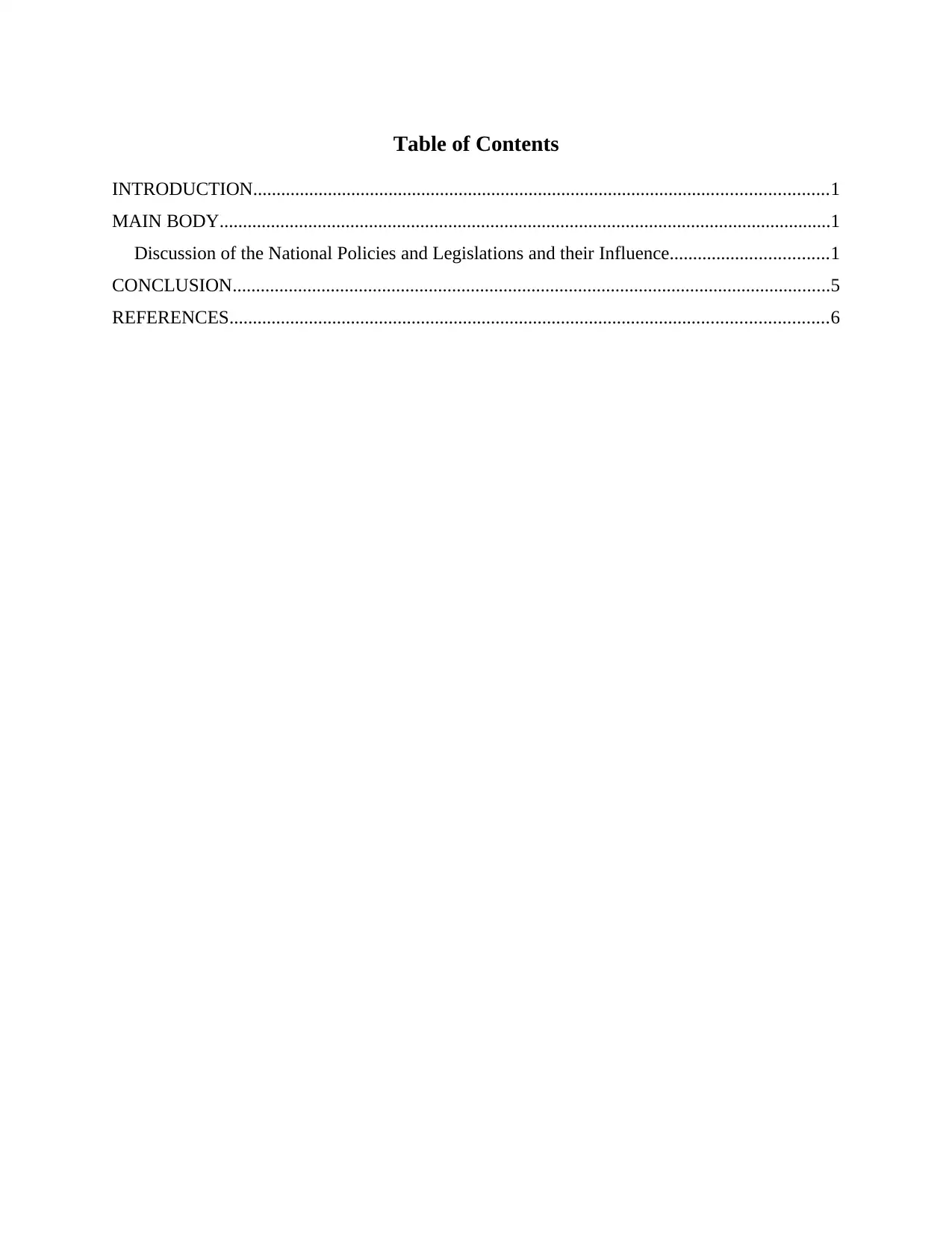
Table of Contents
INTRODUCTION...........................................................................................................................1
MAIN BODY...................................................................................................................................1
Discussion of the National Policies and Legislations and their Influence..................................1
CONCLUSION................................................................................................................................5
REFERENCES................................................................................................................................6
INTRODUCTION...........................................................................................................................1
MAIN BODY...................................................................................................................................1
Discussion of the National Policies and Legislations and their Influence..................................1
CONCLUSION................................................................................................................................5
REFERENCES................................................................................................................................6
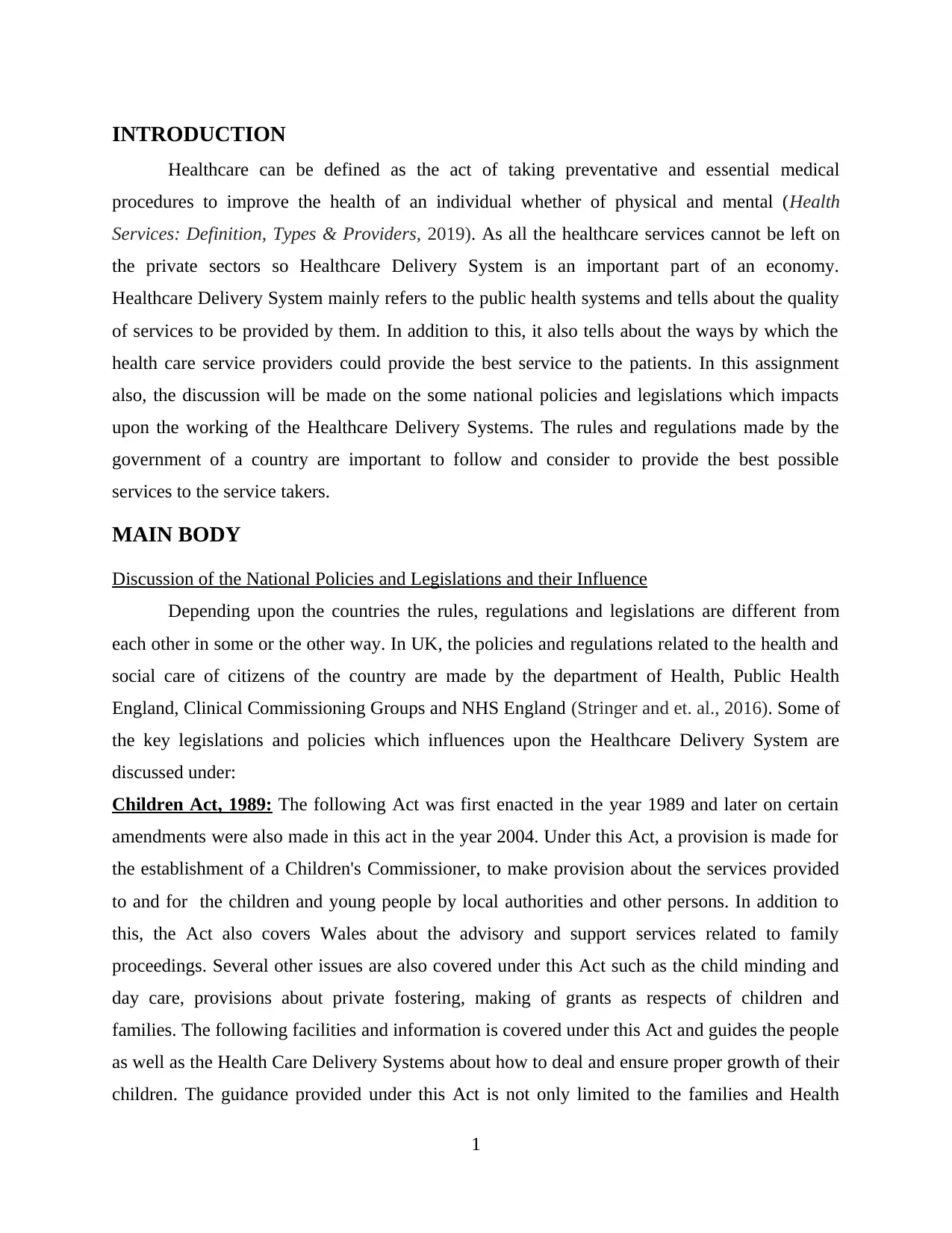
INTRODUCTION
Healthcare can be defined as the act of taking preventative and essential medical
procedures to improve the health of an individual whether of physical and mental (Health
Services: Definition, Types & Providers, 2019). As all the healthcare services cannot be left on
the private sectors so Healthcare Delivery System is an important part of an economy.
Healthcare Delivery System mainly refers to the public health systems and tells about the quality
of services to be provided by them. In addition to this, it also tells about the ways by which the
health care service providers could provide the best service to the patients. In this assignment
also, the discussion will be made on the some national policies and legislations which impacts
upon the working of the Healthcare Delivery Systems. The rules and regulations made by the
government of a country are important to follow and consider to provide the best possible
services to the service takers.
MAIN BODY
Discussion of the National Policies and Legislations and their Influence
Depending upon the countries the rules, regulations and legislations are different from
each other in some or the other way. In UK, the policies and regulations related to the health and
social care of citizens of the country are made by the department of Health, Public Health
England, Clinical Commissioning Groups and NHS England (Stringer and et. al., 2016). Some of
the key legislations and policies which influences upon the Healthcare Delivery System are
discussed under:
Children Act, 1989: The following Act was first enacted in the year 1989 and later on certain
amendments were also made in this act in the year 2004. Under this Act, a provision is made for
the establishment of a Children's Commissioner, to make provision about the services provided
to and for the children and young people by local authorities and other persons. In addition to
this, the Act also covers Wales about the advisory and support services related to family
proceedings. Several other issues are also covered under this Act such as the child minding and
day care, provisions about private fostering, making of grants as respects of children and
families. The following facilities and information is covered under this Act and guides the people
as well as the Health Care Delivery Systems about how to deal and ensure proper growth of their
children. The guidance provided under this Act is not only limited to the families and Health
1
Healthcare can be defined as the act of taking preventative and essential medical
procedures to improve the health of an individual whether of physical and mental (Health
Services: Definition, Types & Providers, 2019). As all the healthcare services cannot be left on
the private sectors so Healthcare Delivery System is an important part of an economy.
Healthcare Delivery System mainly refers to the public health systems and tells about the quality
of services to be provided by them. In addition to this, it also tells about the ways by which the
health care service providers could provide the best service to the patients. In this assignment
also, the discussion will be made on the some national policies and legislations which impacts
upon the working of the Healthcare Delivery Systems. The rules and regulations made by the
government of a country are important to follow and consider to provide the best possible
services to the service takers.
MAIN BODY
Discussion of the National Policies and Legislations and their Influence
Depending upon the countries the rules, regulations and legislations are different from
each other in some or the other way. In UK, the policies and regulations related to the health and
social care of citizens of the country are made by the department of Health, Public Health
England, Clinical Commissioning Groups and NHS England (Stringer and et. al., 2016). Some of
the key legislations and policies which influences upon the Healthcare Delivery System are
discussed under:
Children Act, 1989: The following Act was first enacted in the year 1989 and later on certain
amendments were also made in this act in the year 2004. Under this Act, a provision is made for
the establishment of a Children's Commissioner, to make provision about the services provided
to and for the children and young people by local authorities and other persons. In addition to
this, the Act also covers Wales about the advisory and support services related to family
proceedings. Several other issues are also covered under this Act such as the child minding and
day care, provisions about private fostering, making of grants as respects of children and
families. The following facilities and information is covered under this Act and guides the people
as well as the Health Care Delivery Systems about how to deal and ensure proper growth of their
children. The guidance provided under this Act is not only limited to the families and Health
1
⊘ This is a preview!⊘
Do you want full access?
Subscribe today to unlock all pages.

Trusted by 1+ million students worldwide
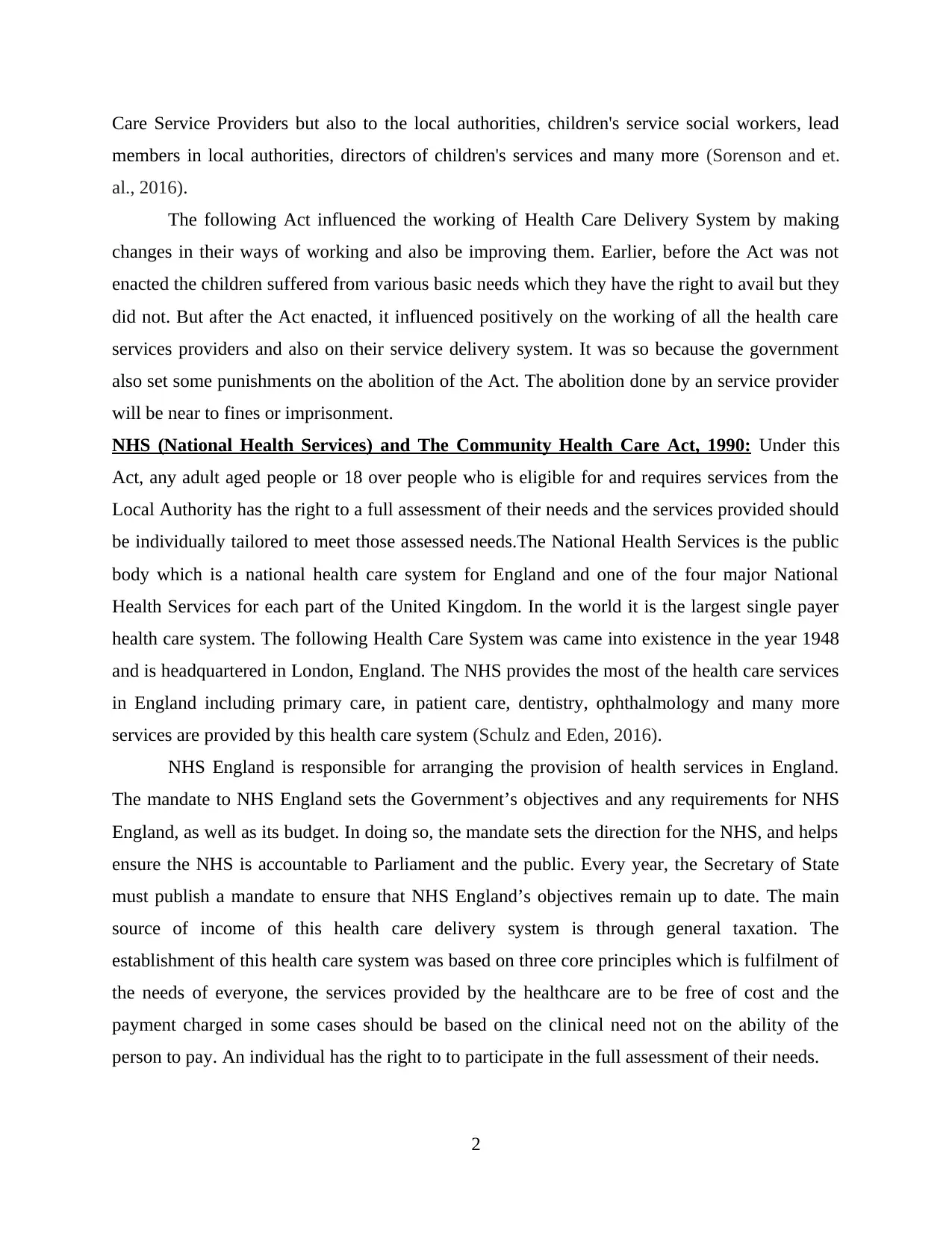
Care Service Providers but also to the local authorities, children's service social workers, lead
members in local authorities, directors of children's services and many more (Sorenson and et.
al., 2016).
The following Act influenced the working of Health Care Delivery System by making
changes in their ways of working and also be improving them. Earlier, before the Act was not
enacted the children suffered from various basic needs which they have the right to avail but they
did not. But after the Act enacted, it influenced positively on the working of all the health care
services providers and also on their service delivery system. It was so because the government
also set some punishments on the abolition of the Act. The abolition done by an service provider
will be near to fines or imprisonment.
NHS (National Health Services) and The Community Health Care Act, 1990: Under this
Act, any adult aged people or 18 over people who is eligible for and requires services from the
Local Authority has the right to a full assessment of their needs and the services provided should
be individually tailored to meet those assessed needs.The National Health Services is the public
body which is a national health care system for England and one of the four major National
Health Services for each part of the United Kingdom. In the world it is the largest single payer
health care system. The following Health Care System was came into existence in the year 1948
and is headquartered in London, England. The NHS provides the most of the health care services
in England including primary care, in patient care, dentistry, ophthalmology and many more
services are provided by this health care system (Schulz and Eden, 2016).
NHS England is responsible for arranging the provision of health services in England.
The mandate to NHS England sets the Government’s objectives and any requirements for NHS
England, as well as its budget. In doing so, the mandate sets the direction for the NHS, and helps
ensure the NHS is accountable to Parliament and the public. Every year, the Secretary of State
must publish a mandate to ensure that NHS England’s objectives remain up to date. The main
source of income of this health care delivery system is through general taxation. The
establishment of this health care system was based on three core principles which is fulfilment of
the needs of everyone, the services provided by the healthcare are to be free of cost and the
payment charged in some cases should be based on the clinical need not on the ability of the
person to pay. An individual has the right to to participate in the full assessment of their needs.
2
members in local authorities, directors of children's services and many more (Sorenson and et.
al., 2016).
The following Act influenced the working of Health Care Delivery System by making
changes in their ways of working and also be improving them. Earlier, before the Act was not
enacted the children suffered from various basic needs which they have the right to avail but they
did not. But after the Act enacted, it influenced positively on the working of all the health care
services providers and also on their service delivery system. It was so because the government
also set some punishments on the abolition of the Act. The abolition done by an service provider
will be near to fines or imprisonment.
NHS (National Health Services) and The Community Health Care Act, 1990: Under this
Act, any adult aged people or 18 over people who is eligible for and requires services from the
Local Authority has the right to a full assessment of their needs and the services provided should
be individually tailored to meet those assessed needs.The National Health Services is the public
body which is a national health care system for England and one of the four major National
Health Services for each part of the United Kingdom. In the world it is the largest single payer
health care system. The following Health Care System was came into existence in the year 1948
and is headquartered in London, England. The NHS provides the most of the health care services
in England including primary care, in patient care, dentistry, ophthalmology and many more
services are provided by this health care system (Schulz and Eden, 2016).
NHS England is responsible for arranging the provision of health services in England.
The mandate to NHS England sets the Government’s objectives and any requirements for NHS
England, as well as its budget. In doing so, the mandate sets the direction for the NHS, and helps
ensure the NHS is accountable to Parliament and the public. Every year, the Secretary of State
must publish a mandate to ensure that NHS England’s objectives remain up to date. The main
source of income of this health care delivery system is through general taxation. The
establishment of this health care system was based on three core principles which is fulfilment of
the needs of everyone, the services provided by the healthcare are to be free of cost and the
payment charged in some cases should be based on the clinical need not on the ability of the
person to pay. An individual has the right to to participate in the full assessment of their needs.
2
Paraphrase This Document
Need a fresh take? Get an instant paraphrase of this document with our AI Paraphraser
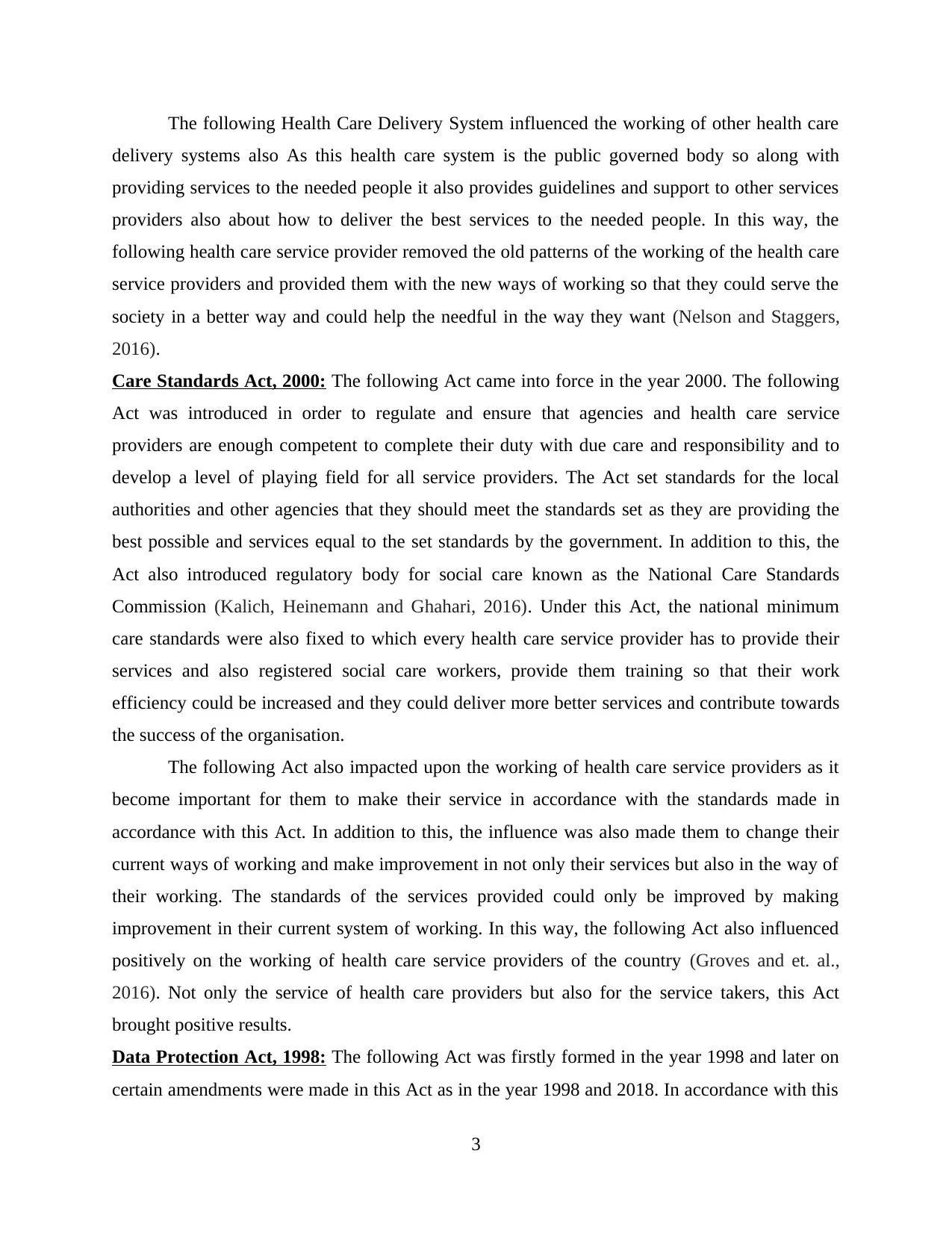
The following Health Care Delivery System influenced the working of other health care
delivery systems also As this health care system is the public governed body so along with
providing services to the needed people it also provides guidelines and support to other services
providers also about how to deliver the best services to the needed people. In this way, the
following health care service provider removed the old patterns of the working of the health care
service providers and provided them with the new ways of working so that they could serve the
society in a better way and could help the needful in the way they want (Nelson and Staggers,
2016).
Care Standards Act, 2000: The following Act came into force in the year 2000. The following
Act was introduced in order to regulate and ensure that agencies and health care service
providers are enough competent to complete their duty with due care and responsibility and to
develop a level of playing field for all service providers. The Act set standards for the local
authorities and other agencies that they should meet the standards set as they are providing the
best possible and services equal to the set standards by the government. In addition to this, the
Act also introduced regulatory body for social care known as the National Care Standards
Commission (Kalich, Heinemann and Ghahari, 2016). Under this Act, the national minimum
care standards were also fixed to which every health care service provider has to provide their
services and also registered social care workers, provide them training so that their work
efficiency could be increased and they could deliver more better services and contribute towards
the success of the organisation.
The following Act also impacted upon the working of health care service providers as it
become important for them to make their service in accordance with the standards made in
accordance with this Act. In addition to this, the influence was also made them to change their
current ways of working and make improvement in not only their services but also in the way of
their working. The standards of the services provided could only be improved by making
improvement in their current system of working. In this way, the following Act also influenced
positively on the working of health care service providers of the country (Groves and et. al.,
2016). Not only the service of health care providers but also for the service takers, this Act
brought positive results.
Data Protection Act, 1998: The following Act was firstly formed in the year 1998 and later on
certain amendments were made in this Act as in the year 1998 and 2018. In accordance with this
3
delivery systems also As this health care system is the public governed body so along with
providing services to the needed people it also provides guidelines and support to other services
providers also about how to deliver the best services to the needed people. In this way, the
following health care service provider removed the old patterns of the working of the health care
service providers and provided them with the new ways of working so that they could serve the
society in a better way and could help the needful in the way they want (Nelson and Staggers,
2016).
Care Standards Act, 2000: The following Act came into force in the year 2000. The following
Act was introduced in order to regulate and ensure that agencies and health care service
providers are enough competent to complete their duty with due care and responsibility and to
develop a level of playing field for all service providers. The Act set standards for the local
authorities and other agencies that they should meet the standards set as they are providing the
best possible and services equal to the set standards by the government. In addition to this, the
Act also introduced regulatory body for social care known as the National Care Standards
Commission (Kalich, Heinemann and Ghahari, 2016). Under this Act, the national minimum
care standards were also fixed to which every health care service provider has to provide their
services and also registered social care workers, provide them training so that their work
efficiency could be increased and they could deliver more better services and contribute towards
the success of the organisation.
The following Act also impacted upon the working of health care service providers as it
become important for them to make their service in accordance with the standards made in
accordance with this Act. In addition to this, the influence was also made them to change their
current ways of working and make improvement in not only their services but also in the way of
their working. The standards of the services provided could only be improved by making
improvement in their current system of working. In this way, the following Act also influenced
positively on the working of health care service providers of the country (Groves and et. al.,
2016). Not only the service of health care providers but also for the service takers, this Act
brought positive results.
Data Protection Act, 1998: The following Act was firstly formed in the year 1998 and later on
certain amendments were made in this Act as in the year 1998 and 2018. In accordance with this
3
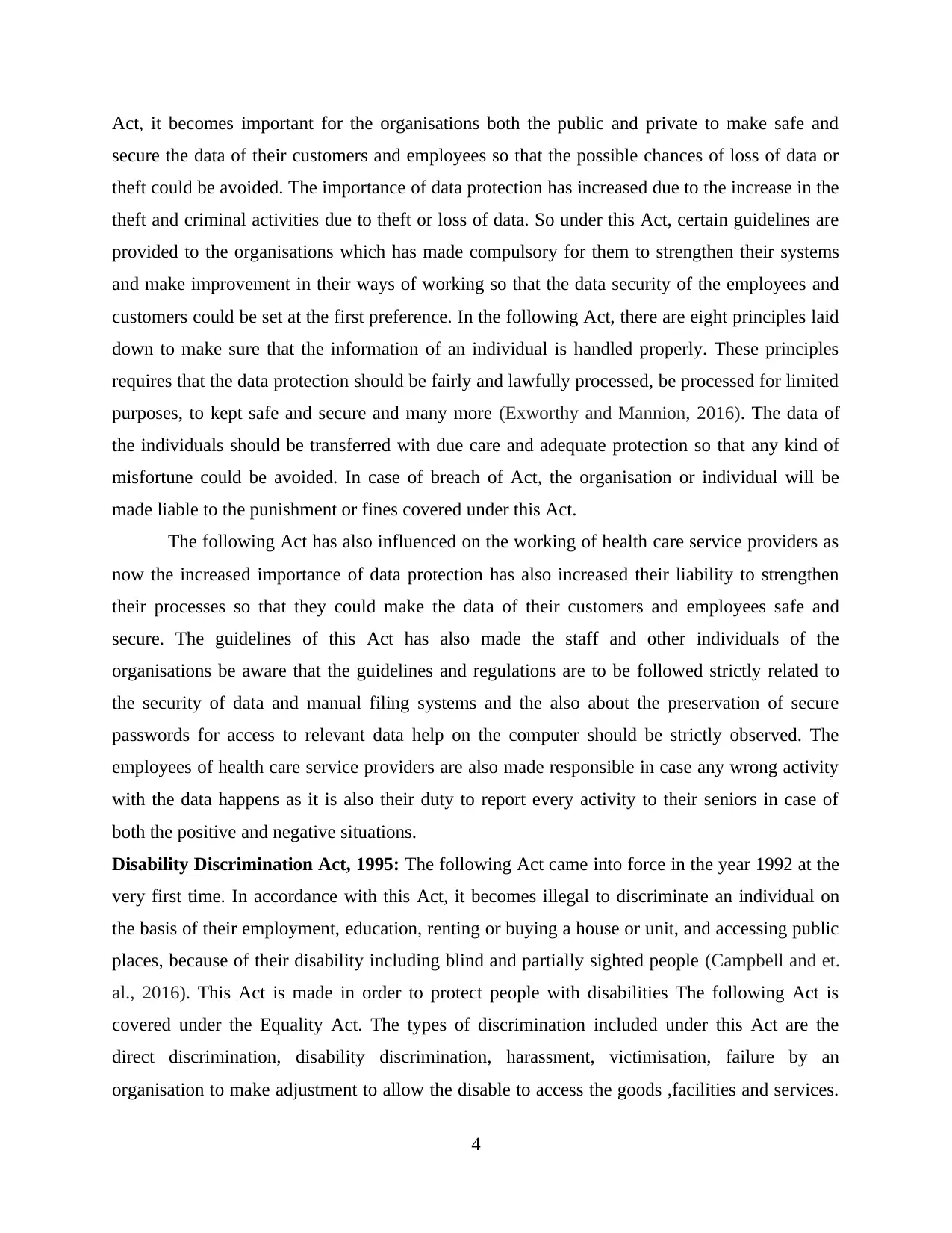
Act, it becomes important for the organisations both the public and private to make safe and
secure the data of their customers and employees so that the possible chances of loss of data or
theft could be avoided. The importance of data protection has increased due to the increase in the
theft and criminal activities due to theft or loss of data. So under this Act, certain guidelines are
provided to the organisations which has made compulsory for them to strengthen their systems
and make improvement in their ways of working so that the data security of the employees and
customers could be set at the first preference. In the following Act, there are eight principles laid
down to make sure that the information of an individual is handled properly. These principles
requires that the data protection should be fairly and lawfully processed, be processed for limited
purposes, to kept safe and secure and many more (Exworthy and Mannion, 2016). The data of
the individuals should be transferred with due care and adequate protection so that any kind of
misfortune could be avoided. In case of breach of Act, the organisation or individual will be
made liable to the punishment or fines covered under this Act.
The following Act has also influenced on the working of health care service providers as
now the increased importance of data protection has also increased their liability to strengthen
their processes so that they could make the data of their customers and employees safe and
secure. The guidelines of this Act has also made the staff and other individuals of the
organisations be aware that the guidelines and regulations are to be followed strictly related to
the security of data and manual filing systems and the also about the preservation of secure
passwords for access to relevant data help on the computer should be strictly observed. The
employees of health care service providers are also made responsible in case any wrong activity
with the data happens as it is also their duty to report every activity to their seniors in case of
both the positive and negative situations.
Disability Discrimination Act, 1995: The following Act came into force in the year 1992 at the
very first time. In accordance with this Act, it becomes illegal to discriminate an individual on
the basis of their employment, education, renting or buying a house or unit, and accessing public
places, because of their disability including blind and partially sighted people (Campbell and et.
al., 2016). This Act is made in order to protect people with disabilities The following Act is
covered under the Equality Act. The types of discrimination included under this Act are the
direct discrimination, disability discrimination, harassment, victimisation, failure by an
organisation to make adjustment to allow the disable to access the goods ,facilities and services.
4
secure the data of their customers and employees so that the possible chances of loss of data or
theft could be avoided. The importance of data protection has increased due to the increase in the
theft and criminal activities due to theft or loss of data. So under this Act, certain guidelines are
provided to the organisations which has made compulsory for them to strengthen their systems
and make improvement in their ways of working so that the data security of the employees and
customers could be set at the first preference. In the following Act, there are eight principles laid
down to make sure that the information of an individual is handled properly. These principles
requires that the data protection should be fairly and lawfully processed, be processed for limited
purposes, to kept safe and secure and many more (Exworthy and Mannion, 2016). The data of
the individuals should be transferred with due care and adequate protection so that any kind of
misfortune could be avoided. In case of breach of Act, the organisation or individual will be
made liable to the punishment or fines covered under this Act.
The following Act has also influenced on the working of health care service providers as
now the increased importance of data protection has also increased their liability to strengthen
their processes so that they could make the data of their customers and employees safe and
secure. The guidelines of this Act has also made the staff and other individuals of the
organisations be aware that the guidelines and regulations are to be followed strictly related to
the security of data and manual filing systems and the also about the preservation of secure
passwords for access to relevant data help on the computer should be strictly observed. The
employees of health care service providers are also made responsible in case any wrong activity
with the data happens as it is also their duty to report every activity to their seniors in case of
both the positive and negative situations.
Disability Discrimination Act, 1995: The following Act came into force in the year 1992 at the
very first time. In accordance with this Act, it becomes illegal to discriminate an individual on
the basis of their employment, education, renting or buying a house or unit, and accessing public
places, because of their disability including blind and partially sighted people (Campbell and et.
al., 2016). This Act is made in order to protect people with disabilities The following Act is
covered under the Equality Act. The types of discrimination included under this Act are the
direct discrimination, disability discrimination, harassment, victimisation, failure by an
organisation to make adjustment to allow the disable to access the goods ,facilities and services.
4
⊘ This is a preview!⊘
Do you want full access?
Subscribe today to unlock all pages.

Trusted by 1+ million students worldwide
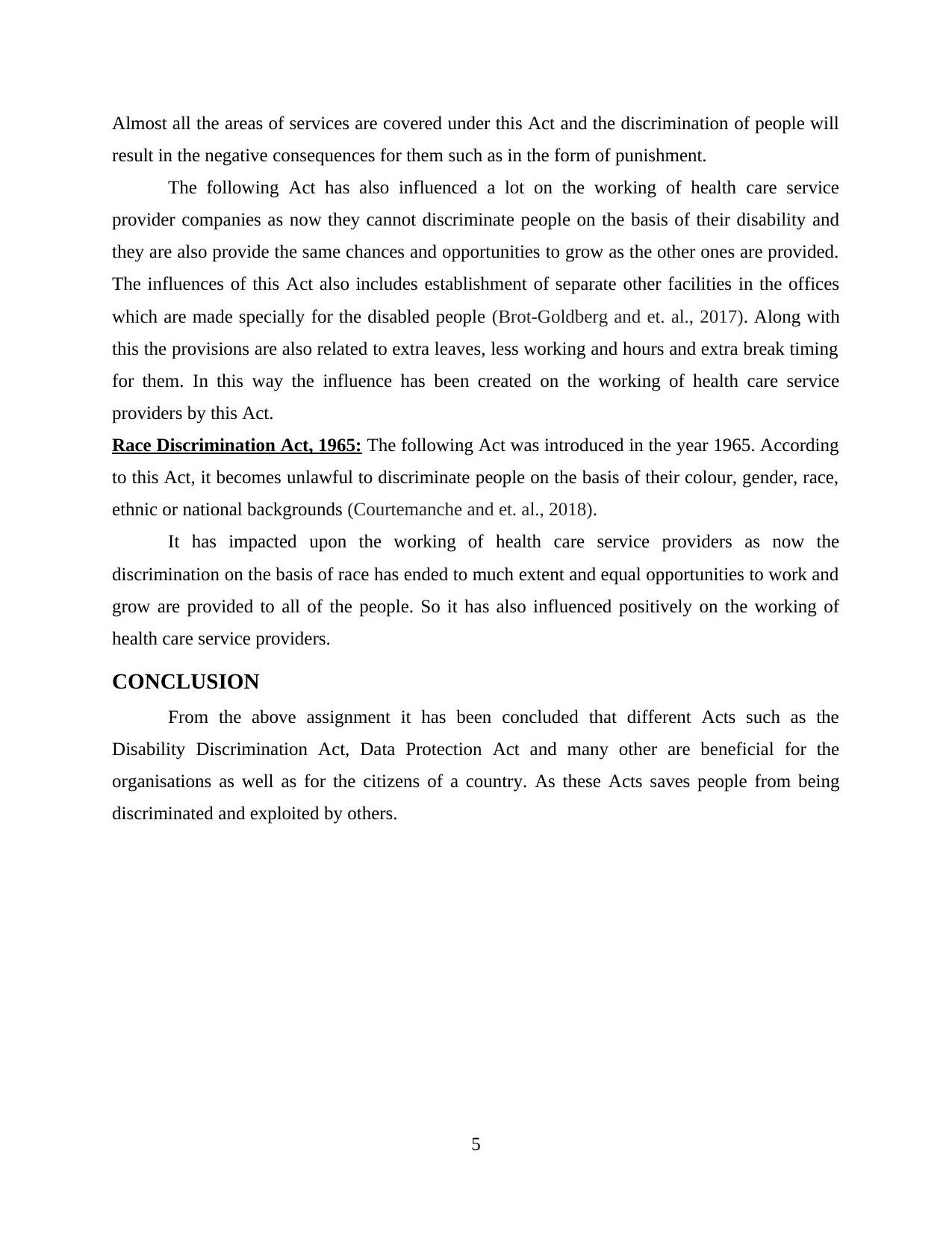
Almost all the areas of services are covered under this Act and the discrimination of people will
result in the negative consequences for them such as in the form of punishment.
The following Act has also influenced a lot on the working of health care service
provider companies as now they cannot discriminate people on the basis of their disability and
they are also provide the same chances and opportunities to grow as the other ones are provided.
The influences of this Act also includes establishment of separate other facilities in the offices
which are made specially for the disabled people (Brot-Goldberg and et. al., 2017). Along with
this the provisions are also related to extra leaves, less working and hours and extra break timing
for them. In this way the influence has been created on the working of health care service
providers by this Act.
Race Discrimination Act, 1965: The following Act was introduced in the year 1965. According
to this Act, it becomes unlawful to discriminate people on the basis of their colour, gender, race,
ethnic or national backgrounds (Courtemanche and et. al., 2018).
It has impacted upon the working of health care service providers as now the
discrimination on the basis of race has ended to much extent and equal opportunities to work and
grow are provided to all of the people. So it has also influenced positively on the working of
health care service providers.
CONCLUSION
From the above assignment it has been concluded that different Acts such as the
Disability Discrimination Act, Data Protection Act and many other are beneficial for the
organisations as well as for the citizens of a country. As these Acts saves people from being
discriminated and exploited by others.
5
result in the negative consequences for them such as in the form of punishment.
The following Act has also influenced a lot on the working of health care service
provider companies as now they cannot discriminate people on the basis of their disability and
they are also provide the same chances and opportunities to grow as the other ones are provided.
The influences of this Act also includes establishment of separate other facilities in the offices
which are made specially for the disabled people (Brot-Goldberg and et. al., 2017). Along with
this the provisions are also related to extra leaves, less working and hours and extra break timing
for them. In this way the influence has been created on the working of health care service
providers by this Act.
Race Discrimination Act, 1965: The following Act was introduced in the year 1965. According
to this Act, it becomes unlawful to discriminate people on the basis of their colour, gender, race,
ethnic or national backgrounds (Courtemanche and et. al., 2018).
It has impacted upon the working of health care service providers as now the
discrimination on the basis of race has ended to much extent and equal opportunities to work and
grow are provided to all of the people. So it has also influenced positively on the working of
health care service providers.
CONCLUSION
From the above assignment it has been concluded that different Acts such as the
Disability Discrimination Act, Data Protection Act and many other are beneficial for the
organisations as well as for the citizens of a country. As these Acts saves people from being
discriminated and exploited by others.
5
Paraphrase This Document
Need a fresh take? Get an instant paraphrase of this document with our AI Paraphraser
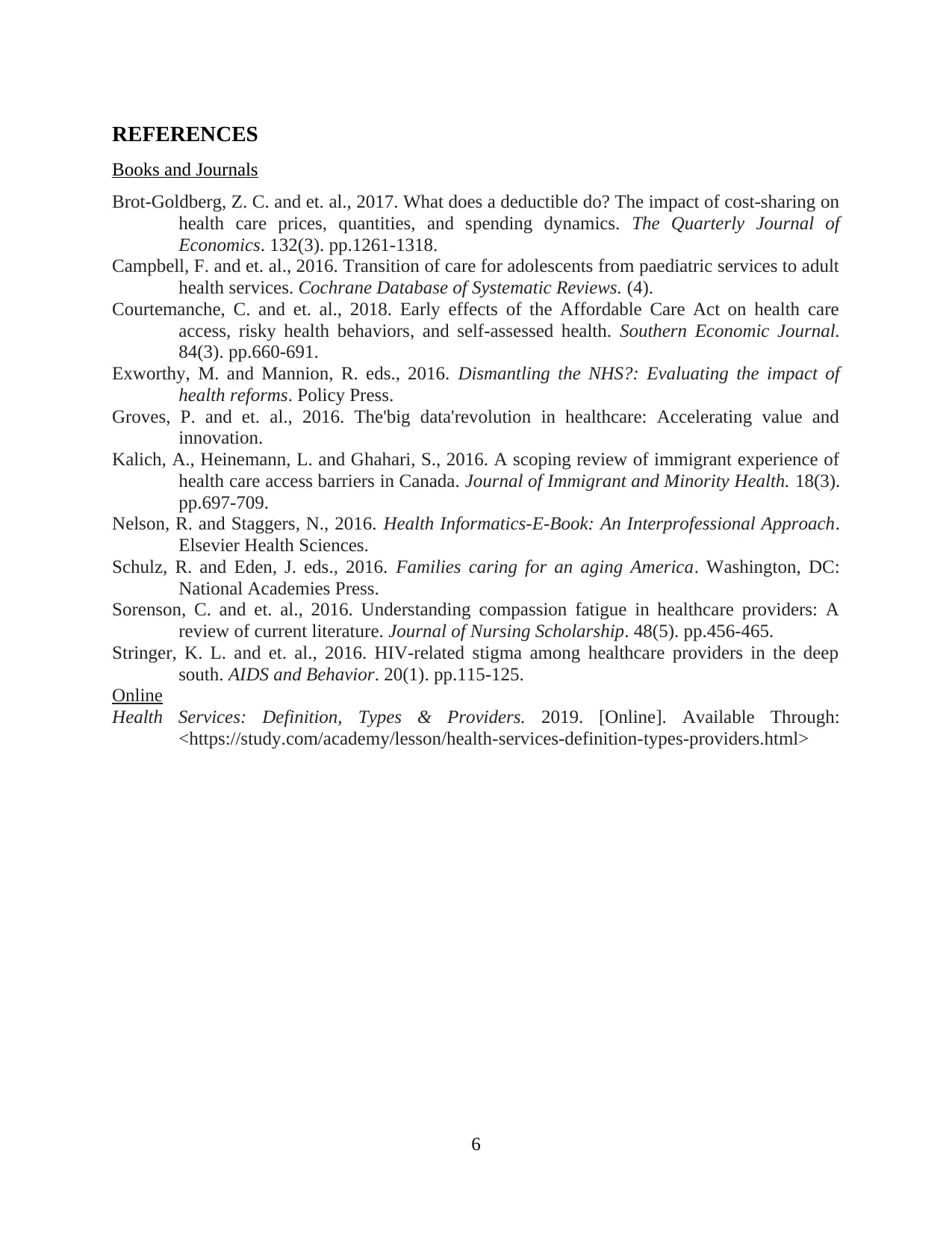
REFERENCES
Books and Journals
Brot-Goldberg, Z. C. and et. al., 2017. What does a deductible do? The impact of cost-sharing on
health care prices, quantities, and spending dynamics. The Quarterly Journal of
Economics. 132(3). pp.1261-1318.
Campbell, F. and et. al., 2016. Transition of care for adolescents from paediatric services to adult
health services. Cochrane Database of Systematic Reviews. (4).
Courtemanche, C. and et. al., 2018. Early effects of the Affordable Care Act on health care
access, risky health behaviors, and self‐assessed health. Southern Economic Journal.
84(3). pp.660-691.
Exworthy, M. and Mannion, R. eds., 2016. Dismantling the NHS?: Evaluating the impact of
health reforms. Policy Press.
Groves, P. and et. al., 2016. The'big data'revolution in healthcare: Accelerating value and
innovation.
Kalich, A., Heinemann, L. and Ghahari, S., 2016. A scoping review of immigrant experience of
health care access barriers in Canada. Journal of Immigrant and Minority Health. 18(3).
pp.697-709.
Nelson, R. and Staggers, N., 2016. Health Informatics-E-Book: An Interprofessional Approach.
Elsevier Health Sciences.
Schulz, R. and Eden, J. eds., 2016. Families caring for an aging America. Washington, DC:
National Academies Press.
Sorenson, C. and et. al., 2016. Understanding compassion fatigue in healthcare providers: A
review of current literature. Journal of Nursing Scholarship. 48(5). pp.456-465.
Stringer, K. L. and et. al., 2016. HIV-related stigma among healthcare providers in the deep
south. AIDS and Behavior. 20(1). pp.115-125.
Online
Health Services: Definition, Types & Providers. 2019. [Online]. Available Through:
<https://study.com/academy/lesson/health-services-definition-types-providers.html>
6
Books and Journals
Brot-Goldberg, Z. C. and et. al., 2017. What does a deductible do? The impact of cost-sharing on
health care prices, quantities, and spending dynamics. The Quarterly Journal of
Economics. 132(3). pp.1261-1318.
Campbell, F. and et. al., 2016. Transition of care for adolescents from paediatric services to adult
health services. Cochrane Database of Systematic Reviews. (4).
Courtemanche, C. and et. al., 2018. Early effects of the Affordable Care Act on health care
access, risky health behaviors, and self‐assessed health. Southern Economic Journal.
84(3). pp.660-691.
Exworthy, M. and Mannion, R. eds., 2016. Dismantling the NHS?: Evaluating the impact of
health reforms. Policy Press.
Groves, P. and et. al., 2016. The'big data'revolution in healthcare: Accelerating value and
innovation.
Kalich, A., Heinemann, L. and Ghahari, S., 2016. A scoping review of immigrant experience of
health care access barriers in Canada. Journal of Immigrant and Minority Health. 18(3).
pp.697-709.
Nelson, R. and Staggers, N., 2016. Health Informatics-E-Book: An Interprofessional Approach.
Elsevier Health Sciences.
Schulz, R. and Eden, J. eds., 2016. Families caring for an aging America. Washington, DC:
National Academies Press.
Sorenson, C. and et. al., 2016. Understanding compassion fatigue in healthcare providers: A
review of current literature. Journal of Nursing Scholarship. 48(5). pp.456-465.
Stringer, K. L. and et. al., 2016. HIV-related stigma among healthcare providers in the deep
south. AIDS and Behavior. 20(1). pp.115-125.
Online
Health Services: Definition, Types & Providers. 2019. [Online]. Available Through:
<https://study.com/academy/lesson/health-services-definition-types-providers.html>
6
1 out of 8
Related Documents
Your All-in-One AI-Powered Toolkit for Academic Success.
+13062052269
info@desklib.com
Available 24*7 on WhatsApp / Email
![[object Object]](/_next/static/media/star-bottom.7253800d.svg)
Unlock your academic potential
Copyright © 2020–2026 A2Z Services. All Rights Reserved. Developed and managed by ZUCOL.





